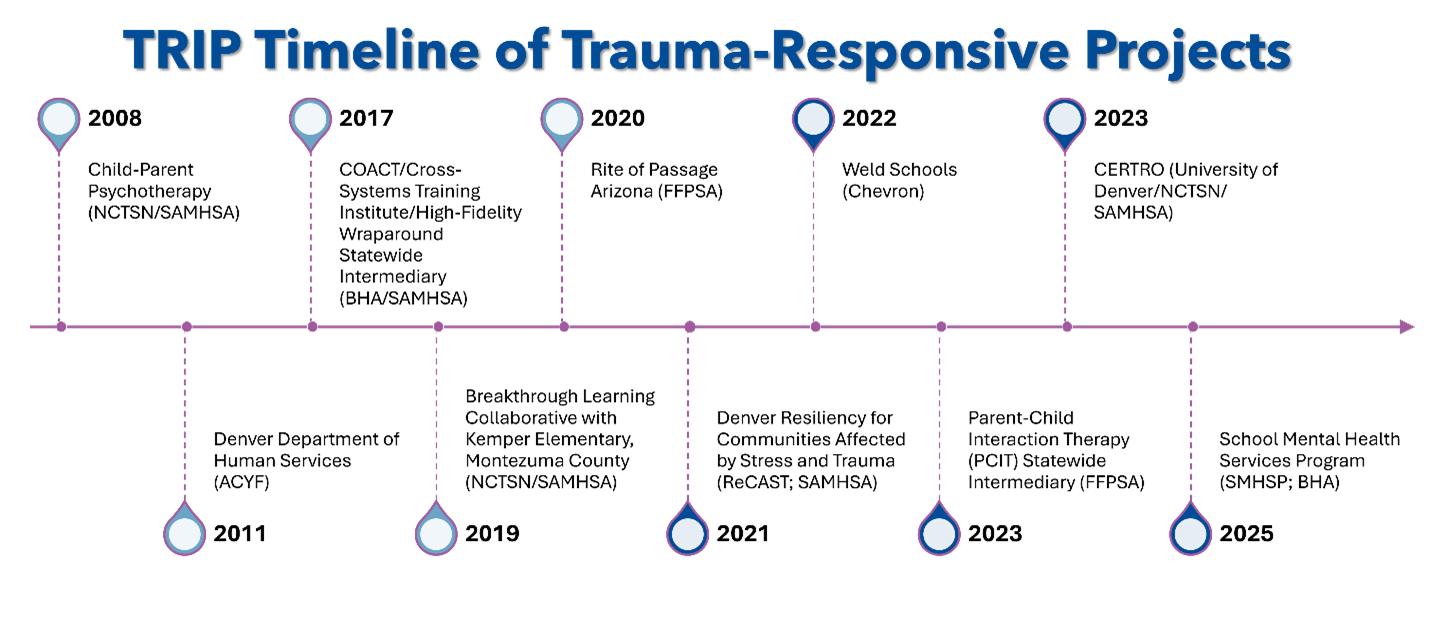TRIP
ProgramPages
RelatedLinks
Trauma-Responsive Implementation and Practice
The Program
The Trauma-Responsive Implementation and Practice (TRIP) program at The Kempe Center integrates, enhances and implements trauma-responsive and culturally appropriate practices for parents, educators and others to help mitigate the impact of trauma. The program provides direct evidence-based clinical services to children and families, facilitates training for professionals across the human service fields and offers implementation guidance for child, youth and family-serving agenciesThe Kempe Center’s TRIP program aims to reduce the impact of trauma through direct, evidence-based clinical services for children and families, while offering specialized education and consultation for human service professionals.. The TRIP Program centers child-, youth-, and family-serving agencies, helping them incorporate trauma-informed strategies into their work.

Our Vision
To create a world where children can reach their full potential, the TRIP program empowers professionals with resilience, emotional intelligence, and social and cultural competence. Effective trauma-responsive practices and treatments require professionals who are equipped to guide and support children through their healing journey. Our goal is to reach more individuals through comprehensive training and resources to help children, families, professionals, and communities thrive.
The Need for Trauma-Responsive Practices
The TRIP program equips professionals with trauma-responsive skills to help lessen the impact of trauma and support healing. We support professionals’ development of skills that benefit all children, with or without a history of trauma, such as emotional regulation and communication. We focus on strengthening the resilience of these professionals, enabling them to continue providing essential care and support to children and families in need. Through this work, TRIP helps create a more capable, compassionate workforce that better serves all.
Trauma-Responsive Practices
The TRIP program works with agencies in education, early childhood education, infant mental health, behavioral health, child welfare, juvenile and criminal justice, health care, and human services to foster trauma-responsive environments. Our approach to implementing trauma-responsive practices is the unique needs of each agency and generally involves needs assessments, goal setting, training, clinical consultation, continuous improvement, program evaluation and planning for long-term sustainability and success.
Through these efforts, we are building a network of professionals who are equipped to support children and families in the face of trauma, ultimately fostering a stronger, more resilient community.

School Mental Health Support Program (SMHSP)
The School Mental Health Support Program (SMHSP), established under HB24-1406, constitutes a strategic initiative within the Colorado Behavioral Health Administration (BHA). We deliver high-quality training, resources, and implementation support to the existing workforce of public school educators. The program emphasizes supporting middle and high schools in rural areas and schools with students who do not have access to mental health care.
TRIP, in partnership with the Butler Institute for Families at University of Denver and in collaboration with BHA, is establishing a robust infrastructure to deliver high-quality training, resources, and support to Colorado schools. This initiative addresses the mental health needs of students by implementing and expanding the SMHSP aligned with the Multi-Tiered Systems of Supports (MTSS) framework. framework. For more information on the project, read our executive summary here and visit the SMHSP webpage here.
TRIP in Schools
Since 2022, TRIP has worked in elementary schools in Weld County to implement trauma-responsive practices. Funded by Chevron and Kempe Foundation, the project provides training, technical assistance, consultation, and evaluation using implementation science practices. For a summary of recent results, click here.
The Kempe Foundation funded an initial evaluation of TRIP in Schools during the 2024-25 school year, and the report is linked here.
PCIT
The Kempe Center’s TRIP program and Growing Together Child and Family Therapy (GTCFT) jointly serve as Colorado’s Parent-Child Interaction Therapy (PCIT) Intermediary, bridging state agencies and PCIT International to expand Parent-Child Interaction Therapy (PCIT) access. Dr. Amanda N’zi, leading GTCFT, and Dr. Evelin Gomez, directing TRIP, work together to advance statewide PCIT implementation and service expansion, with a focus on rural communities. Through data monitoring, infrastructure development, and a comprehensive assessment of provider capacity and regional needs, the intermediary strengthens Colorado’s PCIT network in alignment with Family First Prevention Services Act (FFPSA) priorities.
CERTRO
The Center for Equity and Resilience in Trauma Responsive Organizations (CERTRO) is a joint effort of the Butler Institute for Families at University of Denver (led by Dr. Ashley Brock-Baca) and TRIP. The project is funded as a Category II site of the National Child Traumatic Stress Initiative by Substance Abuse and Mental Health Services Administration (SAMHSA). CERTRO supports organizations to better serve children, youth, and families with a trauma-responsive approach. TRIP contributes to CERTRO through curriculum development, training, communities of practice, consultation, and implementation support. For more information on this project, click here.
Denver ReCAST
The Denver Resiliency for Communities Affected by Stress and Trauma (ReCAST) Project, funded by the Substance Abuse and Mental Health Services Administration (SAMHSA) and administered by the Denver Department of Public Health and Environment, collaborates with six city agencies and seven community-based organizations to support high-risk youth and families. The project focuses on resilience and equity in communities affected by violence and trauma through evidence-based violence prevention, community youth engagement, and access to trauma-informed behavioral health services.
Dr. Evelin Gomez of TRIP partners with the Butler Institute for Families at University of Denver and WellPower. A key outcome is developing a resilience-building program co-created with youth and caregivers through multiple rounds of focus groups in English and Spanish. Through qualitative inquiry and using resilience assessments, we have identified a need for culturally diverse, skill-building, and well-being supports that address family relationships. Our findings indicate that culturally relevant support is essential for at-risk youth and caregivers to enhance their resilience and overall well-being. This investigation has led to the creation and piloting of a youth and caregiver-driven intervention aimed at promoting healing and resilience.
Implementation and Training in Colorado and Across the Nation
- TRIP develops, implements, and disseminates trauma-informed and culturally responsive training curricula to diverse workforces across Colorado. TRIP has developed over two dozen curricula and trained thousands of professionals and lay providers across Colorado.
- TRIP implemented trauma-responsive practices in an elementary school in Montezuma County, which is a county located in the southwest corner of the state of Colorado, providing training and consultation that led to an 80% reduction in student referrals to the principal.
- Nationwide, TRIP has trained thousands of professionals. Training topics include trauma-responsive practices, reflective practices, implementation science, and cultural responsiveness.
- TRIP worked with a large, multi-site behavioral health residential treatment center in Arizona, implementing a comprehensive trauma-responsive approach. This initiative included policy development, training, needs assessment, and consultation for over 350 staff members working with more than 700 students. As a result of TRIP’s support, the agency instituted universal trauma training for staff, revised policies and procedures, and implemented a training-of-trainers model for sustainability. Agency leadership reported significant positive outcomes, including a reduction in seclusion and restraint incidents, increased manager retention, enhanced youth participation in treatment goals, and fewer crisis calls and incidents.
- The Trauma-Responsive Schools Theory of Change Toolkit (click here to download), co-authored by Dr. Evelin Gomez and Dr. Angele Fauchier, has been accessed by over 800 professionals across 29 states and 8 countries. This toolkit offers a step-by-step methodology for planning, adapting, and implementing trauma-informed practices in school settings.
Faculty and Staff of the Trauma-Responsive Implementation and Practice (TRIP) Program
Evelin Gomez, PhD: Associate Professor & Program Director
Angèle Fauchier, PhD: Associate Professor
Stefanie Winfield, MSW: Implementation Specialist Lead



